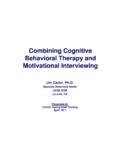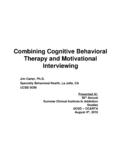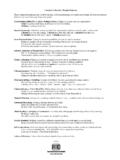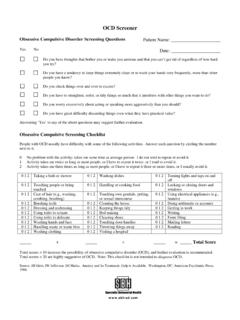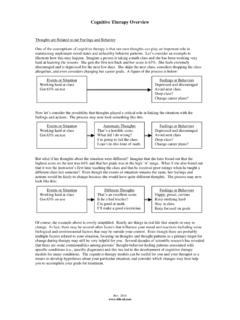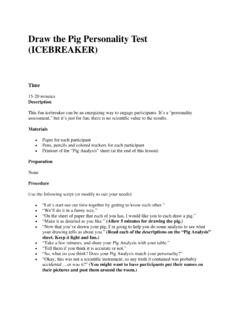Transcription of Irrational, Distorted, and Pessimistic Thinking …
1 Common irrational , distorted , and Pessimistic Thinking patterns These thought patterns often keep us stuck in self-defeating or ineffective behavior patterns and make us unhappy. Perfectionism, Either/Or, or All or Nothing Thinking : Failing to see gray areas or compromises. I must be perfect at all things at all times, or else I m a failure. Nothing is working out for me. Should Statements: Unnecessarily criticizing yourself, others, or the world. I should have seen that coming. I should have done that different. I shouldn t feel this way. He should treat me with more respect. I should get paid more. Over-Personalization: Taking too much responsibility for your or other s situations. Failing to consider role of environment (including other people) in a tough situation.
2 Trying to fix other people s problems. Believing other people s criticisms are the truth rather than an opinion. Selective Attention or Mental Filter: Minimizing positives and focusing instead on perceived negatives. The A on that paper means nothing. The instructor was an easy grader. I handled that situation horribly. It was a complete disaster. Denial or Blaming: Failing to accurately recognize your own role or capabilities in a situation. Trying to do too many things at once. Always being late or missing deadlines. Telling self that you re helpless or hopeless in response to what life dishes out. Blaming others for your lack of efforts. False-permanence: Thinking things are more permanent than they really are. Not forgiving self for mistakes I ll never live this down. Failing to remember that negative situations will let up or ever get better.
3 Over-generalizing or Labeling: A single event falsely becomes generalized to a larger pattern. My boyfriend broke up with I guess I m not marriage material. Labeling self as idiot, failure, loser, downer, ugly, lazy, or a depressive. Catastrophizing or Can t-Stand-Its: Making things out to be worse than they really are (often to avoid them). Failing to also consider positive outcomes as possibilities. Telling self that negative past, present, or future event is worse than really is. Magical Thinking : Telling self everything would be better if I wealthier, taller, thinner, better looking, etc. Emotional Reasoning: Acting as though emotions are reality. I don t feel motivated, so I don t get out of bed. He didn t like my performance, so it must have been lousy. Mind-Reading or Jumping to Conclusions: Assuming what other people are Thinking without really knowing.
4 He doesn t really care. She didn t want to date me because she thought I was dorky. Double Standard: Holding yourself to a different standard than you would apply to a good friend. Being especially hard on yourself and not cutting yourself the same breaks you afford others. Self-Centeredness: Over focusing on self and ignoring how events relate to others, world, or spiritual universe. I was so nervous meeting him. All I could think of was saying the wrong thing. I can t go to the party. I ll look fat in this dress. Fallacy of Fairness: Falsely believing things should always work out fairly. 2003
